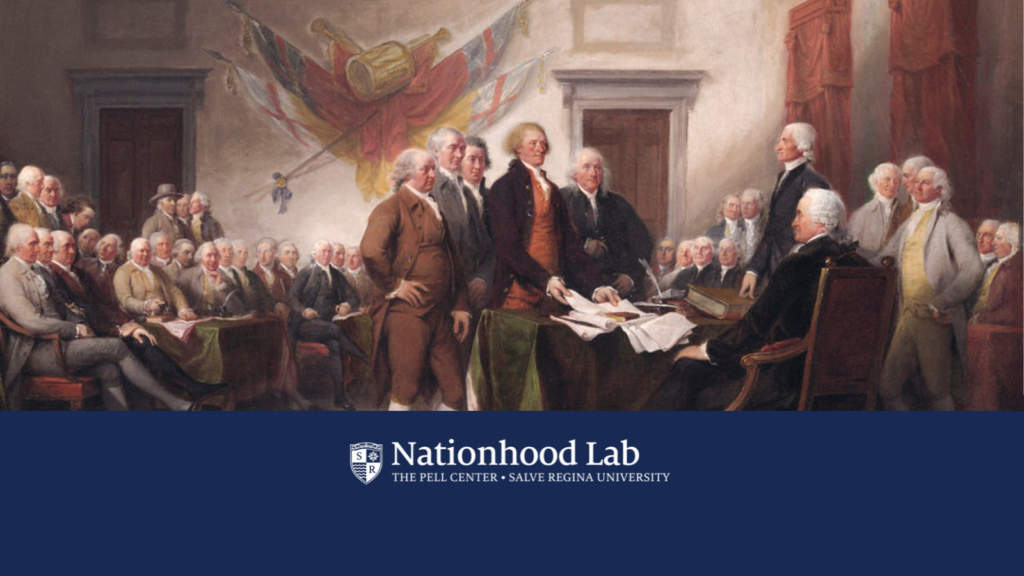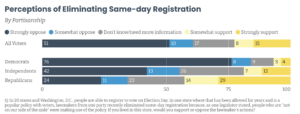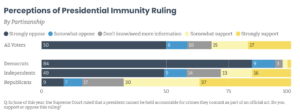Americans Overwhelmingly Oppose Election Subversion, Book Bans, But Split On Partisan Lines Over Voter Suppression And Presidents Being Above Law
Nationwide polls from the Pell Center at Salve Regina University’s Nationhood Lab “stress tested” Americans’ professed commitments to the values in the Declaration of Independence, revealing softer support within the American right
September 18, 2024
NEWPORT, RI, – Americans overwhelmingly reject efforts to overturn elections for political gain and to ban books from public libraries, but they are split on partisan and ideological lines over voter suppression and presidents being above law, new national polling from Salve Regina University’s Nationhood Lab found.
Two nationwide polls “stress tested” Americans’ commitment to democratic values by asking if they supported real world scenarios in which the ideals laid forth in the Declaration of Independence were being compromised. They are part of Nationhood Lab’s work to develop and test a renewed civic national story for the United States based on these values.
Three-quarters of U.S. registered voters oppose local and state governments seeking to force public libraries to “remove books that some people might find offensive or inappropriate” by withholding funds or threatening to evict them. Only 14 percent said they supported these types of actions, which was comprised of 29 percent of Republicans, 10 percent of independents, and three percent of Democrats. 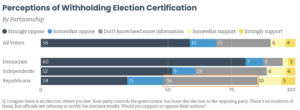
Almost seven in ten voters said they would oppose officials from their party refusing to certify election results to stay in power without any evidence of fraud having taken place. Democrats were overwhelming in their opposition to election subversion, even when committed by their party, with 87 percent opposed – including 80 percent strongly opposed – and only four percent in favor. Independents opposed such subversion by a 49-point margin (61-12), Republicans by 34 points (49-15), but with 36 percent unsure or wanting more information.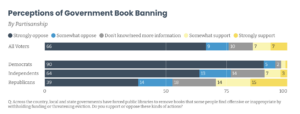
But partisan and ideological considerations split Americans on scenarios involving voter suppression and putting the nation’s leader above the law, a functionally authoritarian situation created by the Supreme Court’s controversial decision in Trump v United States.
Sixty-one percent of voters say they would oppose lawmakers eliminating same-day voter registration because voters who are “not on our side of the aisle” were making use of the policy. Democrats opposed the measure by a 77-point margin (84-7) and independents by 36 points (55-19). Republicans, however, supported partisan-minded voter suppression by 8 points (43-35).
The partisan split was even wider when Americans were asked if they supported the recent Supreme Court ruling “that a president cannot be held accountable for crimes they commit as part of an official act.” While Americans overall oppose the ruling 58 to 32, a 26-point margin, Republicans support it by a staggering 51-point margin, with 67 percent in support and 16 percent against. Independents oppose the ruling 29-58 (or 29 points), Democrats by a near universal 90 points, (3-93).
“While it’s encouraging that most Americans support the liberal democratic values in the Declaration of Independence in practice, it’s alarming that so many on the American right are willing to betray those ideals in the pursuit of power,” Nationhood Lab director Colin Woodard said. “The data from our surveys shows the threat to our democracy is overwhelmingly concentrated on the right and, especially, with groups that support Trumpism.”
Americans universally claim to support the natural rights propositions in the Declaration. The poll asked respondents if they agreed “that as Americans, it’s our job to protect one another’s rights” to “life, liberty, and the pursuit of happiness.” Americans agreed by 97-2, one of the largest margins the pollster, Embold Research, had seen in any survey question they had posed. This accorded with the results of Nationhood Lab’s April 2024 poll that found Americans prefer statements of national purpose built on the civic ideals in the Declaration over those based on more narrow concepts like shared heritage, history, or shared character attributes.
Aggressive book bans and election subversion were rejected by all major demographic segments as well as majorities in all of the U.S. regional cultures identified in the American Nations model, which defines regional boundaries based on colonization/settlement history. But majorities of white Evangelicals supported partisan voter suppression (with a net +9 percent approving) and presidential immunity (+42). Trump 2020 voters supported these measures by even larger margins, +12 and +55. Significantly, white evangelicals rejected the aggressive book bans in public libraries (which, unlike school libraries, serve adults as well as children) by a 23-point margin.
This poll of 2734 registered voters nationwide was conducted for Nationhood Lab by Embold Research between Aug. 8 and 15. A full methodology statement can be found here.
Stress testing the Hidden Tribes
Nationhood Lab conducted a second national poll of More in Common’s Hidden Tribes respondents, who have been segmented based not on income, education, or race, but on their core underlying beliefs based on decades of academic work by moral and political psychologists. This poll, conducted for Nationhood Lab by YouGov, asked the same questions of 1000 Hidden Tribes respondents. It again found strong support for presidential immunity and partisan voter suppression only amongst the right wing “tribes” and the level of support was very strong.
Far-right Devoted Conservatives – the committed MAGA demographic – supported presidential immunity by a 79-point margin and voter suppression by 35 points. For Traditional Conservatives those margins of support for these illiberal, anti-democratic stances were 35 and 23 points respectively. This poll also asked if respondents supported Trump’s promise to pardon convicted Jan. 6 insurrectionists, and these two groups said “yes” by 84- and 27-point margins.
None of the other five “tribes” supported any of these measures, with the most left-wing group, Progressive Activists, opposing each by 82- to 97-point margins. Of these five groups, the softest support for the liberal democratic stance came from the two tribes in what the civic organization More in Common calls the “exhausted majority” of the country, Moderates and the Politically Disengaged. For these groups, the margins of support were between nine- and 53-points depending on the question and tribe. But for both groups, significant shares of the respondents said they didn’t know or needed more information, as high as 46 percent (of Politically Disengaged) in the case of the voter suppression question.
This second poll of 1000 Hidden Tribes respondents was conducted by YouGov between Aug. 20 and Aug. 29 with permission from More in Common, which developed the framework. Additional details from both polls can be found at Nationhood Lab.
Nationhood Lab, based at the Pell Center for International Relations and Public Policy at Salve Regina University, is an interdisciplinary research, writing, testing and dissemination project focused on counteracting the authoritarian threat to American democracy and the centrifugal forces threatening the federation’s stability. The project delivers more effective tools with which to describe and defend the American liberal democratic tradition and better understand the forces undermining it.
The Pell Center for International Relations and Public Policy is a think tank on the Salve Regina University campus in historic Newport, Rhode Island. Its programs on domestic and international issues are designed to generate new ideas, to expand public understanding of important issues and, ultimately, to help the public and its leaders make better decisions. Dedicated to honoring Sen. Claiborne Pell’s legacy, the center promotes American engagement in the world, effective government at home and civic participation by all Americans. The Pell Center accomplishes this through research and publications, public events and media programs that run throughout the year.

